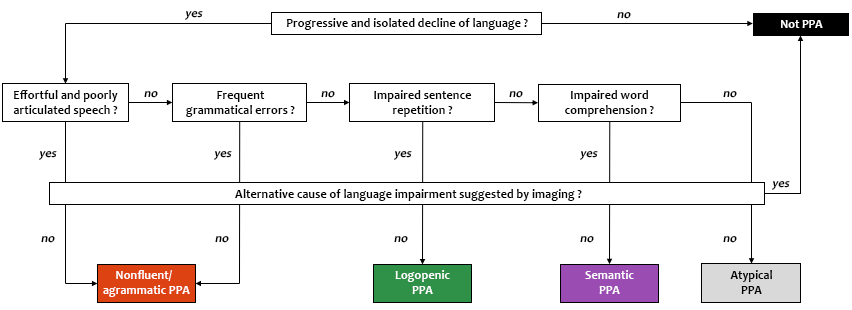Nonfluent/Agrammatic Primary Progressive Aphasia

Based on Marshall et al., 2018
It can be viewed as somewhat similar to Broca’s aphasia, but evolves progressively over time rather than appearing suddenly after a brain injury such as a stroke or a traumatic brain injury.
In this variant, slow and effortful speech are noted, as if there is difficulty getting words out.
Diagnostic features |
|---|
| At least one feature among the following: |
|
| At least two features among the following: |
|
Diagnostic features based on Gorno-Tempini et al., 2011
Videos courtesy of Dr Marilu Gorno-Tempini's team at
University of San Francisco (California), Memory and Aging Center
Other signs and symptoms often associated with nonfluent/ agrammatic PPA:
- Answering yes when the person means no, or vice versa.
- Orofacial apraxia: difficulty to mimic a yawn, a cough, etc.
-
Parkinsonism which can evolve into progressive supranuclear palsy (PSP) or corticobasal syndrome (CBS).
- Paralysis of upward and downward gaze
- Postural instability and falls
- Slower gait
- Akineto-rigid syndrome
- Pseudobulbar dysfunction (lip and tongue mobility disorders, swallowing disorders, changes in the tone of voice)
- Limb apraxia (difficulty executing a series of movements without any other motor or sensory impairment)
- Dystonia (neurological disorder leading to involuntary and sustained muscle contractions)
- Alien limb syndrome (involuntary complex movement of a limb, with the feeling of not being able to control it)
- Changes in behaviour such as apathy, impulsivity and depression.
Testimonial
Mrs. Laforest’s experience with the nonfluent/agrammatic variant of PPA
Resources:
- Association des proches aidants de la Capitale-Nationale: https://www.apacn.org/
- Baluchon Alzheimer: https://baluchonalzheimer.com/
- Monastère des Augustines: https://monastere.ca/en
- Alzheimer’s Society: https://alzheimer.ca/federationquebecoise/en
- AQDR : https://www.aqdr.org/
- The Association for Frontotemporal Degeneration: https://www.theaftd.org